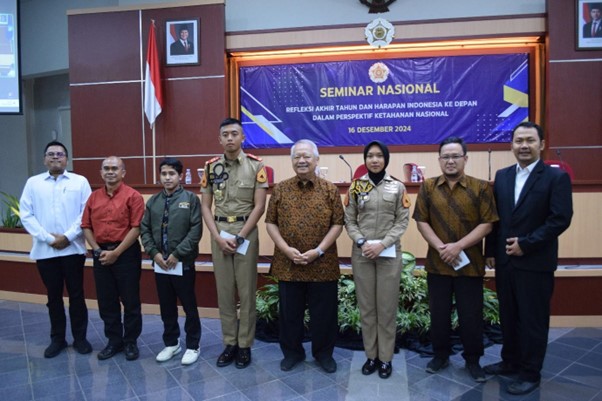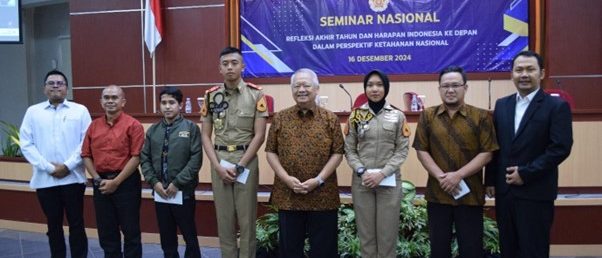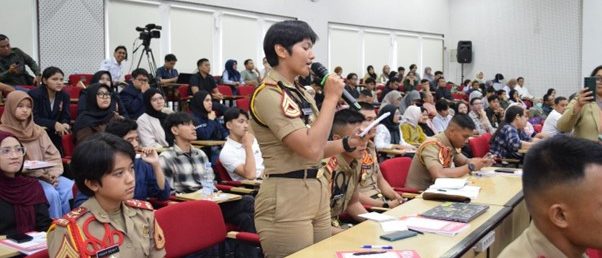
Indonesia’s National Resilience is still lacking in strength, primarily due to issues in the fields of Ideology and Socio-Cultural matters. For example, Pancasila continues to be questioned and often juxtaposed with religion, along with issues like intolerance and corruption.
Since 2005, Indonesia’s Fragility Index has been in the yellow (warning) zone. If there is no improvement, it is likely to shift to the red zone. Therefore, a collective change in perspective is needed for Indonesia to become a strong and advanced nation, in line with the National Ideals of being a Free, United, Sovereign, Just, and Prosperous nation, as outlined in the Asta Cita of President of the Republic of Indonesia, Prabowo Subianto.
Meanwhile, for the Special Region of Yogyakarta (DIY), according to the threat index released by the National Intelligence Agency (BIN), DIY is in a moderate position, with the highest threat in the defense and security sector, followed by issues in socio-cultural aspects and politics.
This was conveyed by Brigadier General TNI Rachmad Pudji Susetyo, S.IP., M.Si., Head of BIN DIY, at the National Seminar organized by the National Resilience Doctoral Program, entitled “End of Year Reflection and Hopes for Indonesia Future in the Perspective of National Resilience,” held hybrid on December 16th 2024, at the Auditorium Room, 5th Floor of SPs UGM Building.
The dynamics in DIY are dominated by political issues following the 2024 General Elections and Regional Elections. Other issues, such as the development of the National Strategic Projects (PSN) and waste management, need to be monitored in 2025, as they may impact the Regional Resilience in DIY.
The National Intelligence Agency is tasked with ensuring the success of the national agenda and securing government policies, including through synergy with Ministries/Agencies and involving active participation from the academic community, particularly students, with the paradigm of DIY’s special status.
Meanwhile, Ridlwan Habib, M.Si., Senior Expert at the Presidential Staff Office (2019-2024) and Director of The Indonesia Intelligence Institute, stated that in 2024, Indonesia will face several important challenges, including the prominent issue of corruption at PT Timah, amounting to 271 trillion. Additionally, political tensions between former President Jokowi and the PDIP create uncertainty regarding the stability of the government, which could affect policy decisions and responses to social issues.
In terms of security, Ridlwan mentioned incidents such as the hacking of the National Data Center and power outages in Sumatra, highlighting vulnerabilities in critical infrastructure. Cyber threats and potential conflicts in the Natuna Sea are major concerns, where regional tensions may lead to further instability. Radicalization, possibly resulting from the collapse of Bashar al-Assad’s regime in Syria, is also a factor to be wary of.
The economic perspective showed inflation is expected to remain stable around 2.3-2.5%, with GDP growth projected to reach 4.96% in 2025. The Rupiah exchange rate is expected to fluctuate between 15,600 and 16,900, depending on global economic dynamics and policies of the ruling regime.
Furthermore, digital mobilization and social fragmentation pose challenges for the government’s legitimacy, as economic protests and tensions between the government and the opposition may trigger unrest. The increase of students and youth mobilization is crucial for the government to respond effectively to maintain social and political stability in Indonesia.
Similarly, Ir. Laksamana Sukardi, Economist, Politician, and Minister of State-Owned Enterprises (1999-2000 and 2001-2004), conveyed that Indonesia’s economy shows low per capita income compared to neighboring countries in Asia, with varying income categories. A per capita income below USD 1,025 is considered low, while above USD 12,475 indicates better growth.
Laksamana Sukardi added external threats include dependency on the global financial system, such as SWIFT and currency ratings, as well as high external debt. Additionally, food and energy security remain concerns due to dependency on imports.
On the other hand, internal threats include low human resource quality and significant economic inequality. Incomplete ideologies and intolerance towards minorities are also challenges to be addressed.
At the end of the presentation, … conveyed that Indonesia’s economic growth is often unsustainable, with contributions from illegal practices such as money laundering, drugs, gambling, and corruption. This highlights the need for reforms to achieve healthier and more inclusive growth.
Writer: Tri Laksmi Novitasari
Editor: Arni Wistriatun


